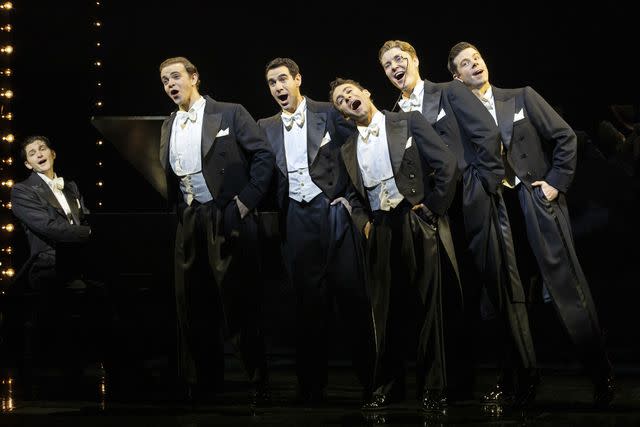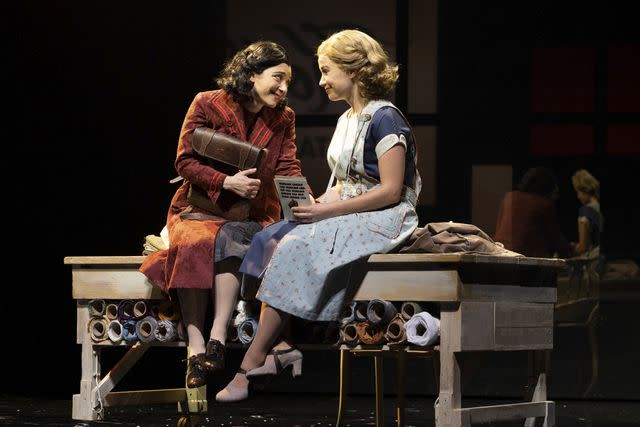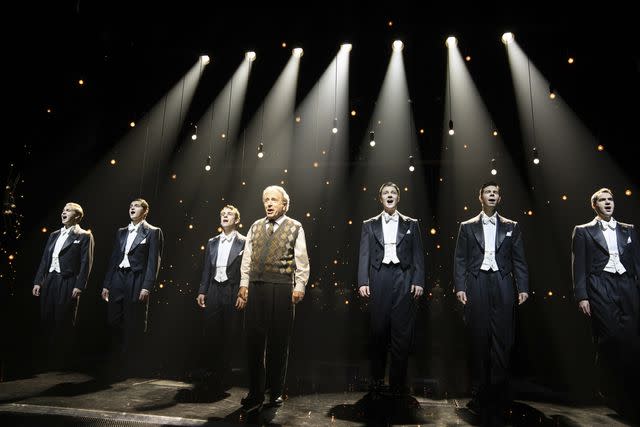“Harmony” review: Barry Manilow's moving musical doesn't truly sing until its second act

- Oops!Something went wrong.Please try again later.
The musical, which features music by Manilow and lyrics and book by his longtime writing partner Bruce Sussman, tells the true story of the German vocal group the Comedian Harmonists.
For the last two decades, Barry Manilow and his longtime writing partner Bruce Sussman have worked tirelessly to bring Harmony: A New Musical to Broadway. The show, which opens at the Ethel Barrymore Theater on Nov. 13, chronicles the true story of the Comedian Harmonists, a six-membered German vocal group that rose to popularity in the late 1920s only to be completely erased from history because it featured Jewish members. With Harmony, Manilow and Sussman succeed in shining a light on a moving and timely tale, but the show doesn't truly begin to sing until its second act.
That's because Harmony spends far too long masquerading as a saccharine, rags-to-riches story when, at its heart, it's a historical drama about a friendship group struggling to fight for their personal and professional lives amid the rise of fascism, antisemitism, and the Nazi party in Germany. Much of the first act is centered around the Harmonists' humble beginnings, with theatergoers taken back in time Twilight Zone-style to witness composer Harry Frommermann (Zal Owen) place an advertisement in the Berliner for singers and meet the cheeky Asparuh "Lesh" Leschnikoff (Steven Telsey), quote aficionado Erich Collin (Eric Peters), smooth-talking pianist Erwin "Chopin" Bootz (Blake Roman), deadpan baritone Robert "Bobby" Biberti (Sean Bell), and kindhearted Roman "Rabbi" Cycowski (Danny Kornfeld).
The group's starry-eyed rise to the top — narrated like a coming-of-age film by an older version of Rabbi (Chip Zien) — soon starts to feel tonally jarring as horrific real-life historical events begin to shape the world around them. This incongruity is, thankfully, remedied by the musical's emotional second half, which focuses less on the Harmonists' achievements and more on their survival as the group, particularly its Jewish members and their families, face further unjust persecution in the years leading up to the Holocaust and World War II.

Although the musical does not feature any of the Comedian Harmonists' actual works, it's easy to understand why the group would've been a hit with all of the spirited numbers that Manilow and Sussman have crafted for them. The duo have wonderfully captured the sound of the era with their vibrant orchestrations and dynamic lyrics, which range from starry-eyed anthems ("This Is Our Time") to swoony love ballads ("In This World") and beyond. Harmony's impeccably cast ensemble — five of whom are making their Broadway debut in the production — play off one another perfectly, allowing their voices to weave together into one cohesive sound as they flawlessly pull off complex dance numbers and side-splitting comedy gags.
As their name suggests, the Comedian Harmonists are genuinely funny too — their witty, slapstick performance of "How Can I Serve You, Madame?", which features the members spinning around in their boxers and spraying water across the stage, is a standout moment.
But, for all of the charisma that the Harmonists bring to their performances, offstage the characters remain largely undefined. With decades of history to cover, director Warren Carlyle keeps Harmony moving at a speedy pace that doesn't allow its core cast time to process the positive and negative experiences in their rapidly-changing lives until reality cannot be ignored. The Harmonists' wives, played by Sierra Boggess and Julie Benko, have even less to work with: one acts as a loving support system for her husband, while the other is a fierce revolutionary. Still, it's easy to root for these foggy characters because the show's stellar ensemble fleshes them out to the best of their ability, offering glimpses of their joys and heartbreaks through their physical performances rather than exchanging actual lines of dialogue.

Their relationship quarrels are also often solved too easily. In one scene, Boggess' Mary relays her complex concerns about marrying Rabbi only for her to instantly change her mind once he swoops into her workplace and sings a song at her ("Every Single Day"). Transforming the song into a duet would've at least allowed theatergoers the chance to witness Mary's viewpoint shift, rather than relying solely on Boggess' conflicted gaze and Kornfeld's vocals to seal the deal — its talented cast has certainly proven that they can harmonize, after all. Let them sing!
Instead, the older version of Rabbi is the only character who is properly given time to address his feelings during the show's two and a half hour runtime. The character, who is a recent addition to the musical, initially feels out of sorts surrounded by his historical counterparts, but quickly becomes the show's collective conscience (and steps in for a few smaller roles too). Aware of what lies in store for them, he lambasts his younger self for acting as a peacekeeper during key moments that will inevitably go on to define the Harmonists' lives and, later, laments over their fates. Zien, a Broadway veteran in his own right, easily wins over audiences with his charming, affable storytelling before absolutely decimating their hearts with his phenomenal final performance of the night, "Threnody." The theater should sell packets of tissues, is all I'm saying.

Despite its caveats, Harmony is a powerful musical that, by its conclusion, makes one's heart break for the Comedian Harmonists and all those who were lost to time because of hatred and cruelty, the echoes of which are still ringing out to this day. Its overall message of peace — "despite our squabbles, we found harmony" — feels more resonant than ever. There's a scene in which Erich, standing under the glossy stage's spotlights, quotes the British poet Percy Bysshe Shelley as he declares, "Music, when soft voices die, vibrates in the memory." Harmony will continue to sing out in the minds of audiences long after they leave the theater, too. Grade: B–
Related content:
Barry Manilow has spent his career wanting to write musicals — with Harmony, it's finally happening
Josh Gad and Andrew Rannells are back on stage together in Gutenberg, just don't call it a reunion
Betty Who is in hell — well, Hadestown: The pop star's Broadway debut is a 'full-circle moment'
Leslie Odom Jr. has been trying to get Purlie Victorious to Broadway for six years
Read the original article on Entertainment Weekly.

